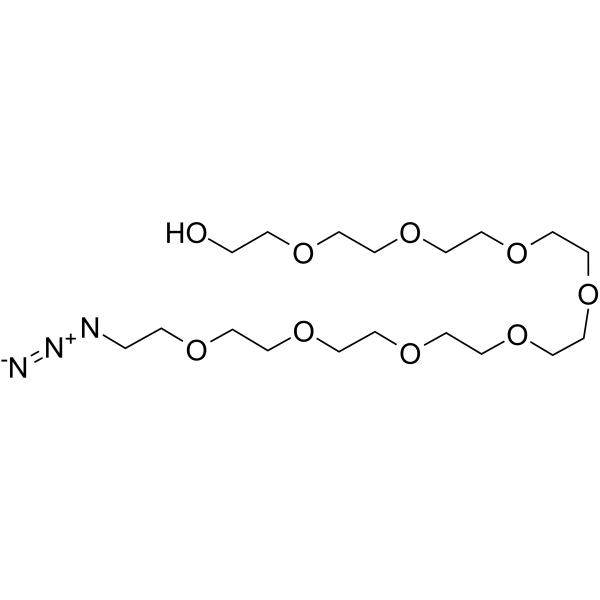
Azido-PEG9-alcohol
CAS No. 1984776-37-5
Azido-PEG9-alcohol( —— )
Catalog No. M26898 CAS No. 1984776-37-5
Azido-PEG9-alcohol is a PEG-based PROTAC linker that can be used in the synthesis of PROTACs.
Purity : >98% (HPLC)
 COA
COA
 Datasheet
Datasheet
 HNMR
HNMR
 HPLC
HPLC
 MSDS
MSDS
 Handing Instructions
Handing Instructions
| Size | Price / USD | Stock | Quantity |
| 50MG | 52 | Get Quote |


|
| 100MG | Get Quote | Get Quote |


|
| 200MG | Get Quote | Get Quote |


|
| 500MG | Get Quote | Get Quote |


|
| 1G | Get Quote | Get Quote |


|
Biological Information
-
Product NameAzido-PEG9-alcohol
-
NoteResearch use only, not for human use.
-
Brief DescriptionAzido-PEG9-alcohol is a PEG-based PROTAC linker that can be used in the synthesis of PROTACs.
-
DescriptionAzido-PEG9-alcohol is a PEG-based PROTAC linker that can be used in the synthesis of PROTACs.(In Vitro):PROTACs contain two different ligands connected by a linker; one is a ligand for an E3 ubiquitin ligase and the other is for the target protein. PROTACs exploit the intracellular ubiquitin-proteasome system to selectively degrade target proteins.
-
In VitroPROTACs contain two different ligands connected by a linker; one is a ligand for an E3 ubiquitin ligase and the other is for the target protein. PROTACs exploit the intracellular ubiquitin-proteasome system to selectively degrade target proteins.
-
In Vivo——
-
Synonyms——
-
PathwayOthers
-
TargetOther Targets
-
RecptorTNIK
-
Research Area——
-
Indication——
Chemical Information
-
CAS Number1984776-37-5
-
Formula Weight439.506
-
Molecular FormulaC18H37N3O9
-
Purity>98% (HPLC)
-
Solubility——
-
SMILESOCCOCCOCCOCCOCCOCCOCCOCCOCCN=[N+]=[N-]
-
Chemical Name——
Shipping & Storage Information
-
Storage(-20℃)
-
ShippingWith Ice Pack
-
Stability≥ 2 years
Reference
1.Li Y, et, al. Discovery of 3,4-Dihydrobenzo[ f][1,4]oxazepin-5(2 H)-one Derivatives as a New Class of Selective TNIK Inhibitors and Evaluation of Their Anti-Colorectal Cancer Effects. J Med Chem. 2022 Jan 5.
molnova catalog



related products
-
2,6-Dihydroxypurine
A purine base found in most body tissues and fluids, certain plants, and some urinary calculi.
-
L-Gulose
L-Gulose is an unnatural monosaccharide. L-Gulose is the putative furanose form of L-sorbosone that exists as a syrup with a sweet taste. It is an L-hexose sugar and an intermediate in the biosynthesis of L-Ascorbate (vitamin C).
-
Sodium montmorilloni...
The montmorillonite-catalyzed reactions of the 5'-phosphorimidazolide of adenosine used as a model generated RNA type oligomers.



 Cart
Cart
 sales@molnova.com
sales@molnova.com


